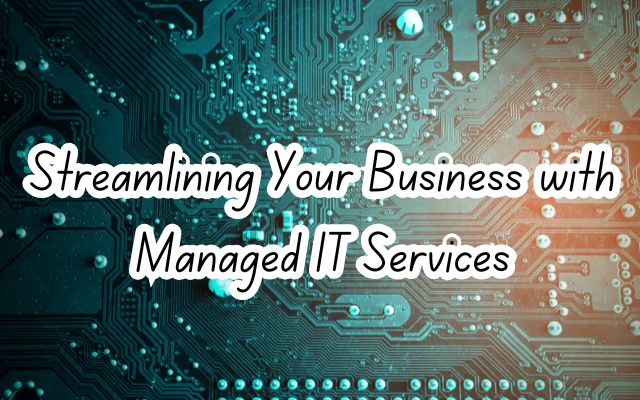Streamlining Your Business with Managed IT Services

In the digital age, the backbone of any successful business lies in its IT infrastructure. From seamless communication to efficient data management, businesses rely heavily on technology to drive productivity and growth. However, managing IT systems can be complex and time-consuming, often diverting valuable resources away from core business activities. This is where Managed IT Services come into play, offering a comprehensive solution to streamline IT operations and enhance overall business performance.
Understanding Managed IT Services
Managed IT Services encompass a range of outsourced IT solutions designed to proactively manage and support a company’s IT infrastructure. These services are typically provided by a third-party Managed Service Provider (MSP) and are tailored to meet the specific needs of each client. From network monitoring and Cybersecurity to helpdesk support and cloud computing, Managed IT Services offer a holistic approach to IT management, ensuring optimal performance, security, and reliability.
The Benefits of Managed IT Services
Proactive Monitoring and Maintenance: Managed IT Services employ advanced monitoring tools to proactively identify and address potential issues before they escalate into major problems. This proactive approach minimizes downtime and ensures continuous operations, keeping your business running smoothly.
Enhanced Security
Cyber threats are a constant concern for businesses of all sizes. Managed IT Services include robust cybersecurity measures such as firewalls, antivirus software, and intrusion detection systems to safeguard against cyberattacks and data breaches. Additionally, regular security updates and patches are applied promptly to mitigate emerging threats.
Cost Efficiency
Outsourcing IT services can result in significant cost savings compared to maintaining an in-house IT department. With Managed IT Services, businesses can benefit from predictable monthly fees and eliminate the need for expensive hardware investments and ongoing maintenance costs. This cost-efficient model allows businesses to allocate resources more effectively and focus on strategic initiatives.
Scalability and Flexibility
As businesses grow and evolve, their IT requirements change accordingly. Managed IT Services offer scalability and flexibility, allowing businesses to easily scale up or down based on their needs. Whether expanding into new markets or adopting emerging technologies, Managed IT Services provide the agility to adapt to changing business demands.
Access to Expertise
Managed Service Providers employ skilled IT professionals with expertise in various domains, including networking, cybersecurity, cloud computing, and more. By partnering with an MSP, businesses gain access to a team of experienced professionals who can provide strategic guidance, technical support, and ongoing training to optimize IT operations.
Focus on Core Business
By outsourcing IT management to a trusted provider, businesses can free up internal resources and focus on core business activities. Instead of troubleshooting IT issues or managing infrastructure upgrades, employees can dedicate their time and energy to driving innovation, serving customers, and achieving business objectives.
Security Management
In today’s interconnected digital landscape, security management is paramount for businesses of all sizes. Managed IT Services offer comprehensive security solutions to protect sensitive data, mitigate cyber threats, and ensure regulatory compliance.
From implementing robust firewalls and antivirus software to conducting regular security audits and penetration testing, Managed Service Providers (MSPs) employ a multi-layered approach to safeguarding IT infrastructure.
By proactively monitoring for potential vulnerabilities and swiftly responding to security incidents, businesses can minimize risks and maintain the integrity of their systems and information assets.
Network Infrastructure Support
A reliable and resilient network infrastructure is essential for seamless connectivity and efficient operations. Managed IT Services provide comprehensive network support, including design, implementation, optimization, and ongoing management.
Whether businesses require wired or wireless networks, LAN or WAN solutions, Managed Service Providers (MSPs) leverage industry best practices and cutting-edge technologies to ensure optimal performance and reliability.
From troubleshooting connectivity issues to scaling network capacity to accommodate growth, MSPs play a crucial role in maintaining the backbone of modern business operations.
VCIO – Virtual CIO
Many businesses lack the resources to hire a full-time Chief Information Officer (CIO) but still require strategic IT leadership and guidance. Virtual CIO (vCIO) services offered by Managed IT Service Providers fill this gap by providing access to experienced IT professionals who can offer strategic advice, technology planning, and IT budgeting.
Acting as an extension of the business’s leadership team, vCIOs help align IT initiatives with overall business objectives, identify opportunities for innovation, and ensure that technology investments deliver maximum value. By leveraging the expertise of a vCIO, businesses can make informed decisions, optimize IT spending, and stay ahead of the competition in today’s rapidly evolving digital landscape.
Cloud Hosting
The shift to cloud computing has transformed the way businesses store, access, and manage data and applications. Managed IT Services include cloud hosting solutions that offer scalability, flexibility, and cost-efficiency. Whether businesses require public, private, or hybrid cloud environments, Managed Service Providers (MSPs) help design, deploy, and manage cloud infrastructure tailored to their specific needs.
From migrating legacy systems to the cloud to optimizing performance and security, MSPs handle all aspects of cloud hosting, allowing businesses to focus on innovation and growth without the burden of managing complex IT environments.
Employee Training
As technology continues to evolve, ongoing employee training and development are essential to ensure that staff have the skills and knowledge required to leverage IT tools effectively. Managed IT Services include employee training programs that cover a wide range of topics, from cybersecurity awareness to software applications and IT best practices.
By investing in training and upskilling, businesses can enhance productivity, reduce the risk of human error, and foster a culture of continuous learning and improvement. Managed Service Providers (MSPs) offer customized training solutions tailored to the specific needs and skill levels of employees, empowering them to make the most of available technology resources.
Microsoft 365
Microsoft 365 (formerly Office 365) has become a cornerstone of productivity and collaboration for businesses worldwide. Managed IT Services include Microsoft 365 deployment, migration, and management to help businesses unlock the full potential of this powerful suite of tools.
From email and document management to video conferencing and teamwork solutions, Managed Service Providers (MSPs) ensure seamless integration, security, and compliance across the Microsoft 365 ecosystem. By leveraging the expertise of MSPs, businesses can optimize workflows, enhance communication, and empower employees to work more efficiently, both in the office and remotely.
Hardware Purchasing & Replacement
Managing hardware assets can be a daunting task for businesses, especially as technology continues to evolve at a rapid pace. Managed IT Services include hardware purchasing and replacement solutions to help businesses procure the right equipment at the right price and replace outdated or malfunctioning hardware as needed.
Managed Service Providers (MSPs) leverage their vendor relationships and industry expertise to source high-quality hardware that meets the business’s specific requirements and budget constraints. From desktops and laptops to servers and networking equipment, MSPs handle the entire hardware lifecycle, from procurement and deployment to maintenance and disposal, allowing businesses to focus on their core activities without the hassle of managing IT hardware.
Frequently Asked Questions
1. What are Managed IT Services?
Managed IT Services refer to outsourced IT solutions provided by third-party Managed Service Providers (MSPs) to proactively manage and support a company’s IT infrastructure. These services encompass a range of offerings, including network monitoring, cybersecurity, helpdesk support, and cloud computing, tailored to meet the specific needs of each client.
2. How do Managed IT Services enhance security?
Managed IT Services employ robust cybersecurity measures such as firewalls, antivirus software, and intrusion detection systems to safeguard against cyber threats and data breaches. Additionally, MSPs conduct regular security audits, apply security updates promptly, and provide employee training to mitigate risks and ensure regulatory compliance.
3. What is a Virtual CIO (vCIO), and why is it beneficial?
A Virtual CIO (vCIO) is an outsourced IT professional who provides strategic IT leadership and guidance to businesses without the need for a full-time Chief Information Officer (CIO). vCIOs help align IT initiatives with overall business objectives, identify opportunities for innovation, and optimize technology investments to drive business growth and success.
4. How can Managed IT Services help with cloud hosting?
Managed IT Services include cloud hosting solutions that offer scalability, flexibility, and cost-efficiency. Managed Service Providers (MSPs) help design, deploy and manage cloud infrastructure tailored to businesses’ specific needs, from migrating legacy systems to optimizing performance and security in the cloud environment.
5. What types of employee training do Managed IT Services provide?
Managed IT Services offers employee training programs covering a wide range of topics, including cybersecurity awareness, software applications, and IT best practices. These training programs are tailored to the specific needs and skill levels of employees, empowering them to leverage IT tools effectively and reduce the risk of human error.
6. How does Managed IT Services handle hardware purchasing and replacement?
Managed IT Services include hardware purchasing and replacement solutions to help businesses procure the right equipment at the right price and replace outdated or malfunctioning hardware as needed. Managed Service Providers (MSPs) leverage vendor relationships and industry expertise to source high-quality hardware, and handle procurement, deployment, maintenance, and disposal, allowing businesses to focus on core activities.
7. What are the benefits of outsourcing IT management to Managed Service Providers?
Outsourcing IT management to Managed Service Providers offers several benefits, including cost efficiency, access to expertise, scalability, and the ability to focus on core business activities. By partnering with MSPs, businesses can leverage advanced technologies, skilled professionals, and proactive IT management to optimize their infrastructure, enhance security, and drive productivity and growth.
Conclusion
Managed IT Services offer a comprehensive solution for businesses looking to streamline their IT operations, enhance security, and drive productivity. From proactive monitoring and maintenance to cost efficiency and scalability, the benefits of Managed IT Services are clear.
By partnering with a trusted Managed Service Provider, businesses can leverage expertise, technology, and resources to optimize their IT infrastructure and focus on achieving their strategic objectives. With SEO-optimized content and a strategic digital marketing approach, businesses can increase their online visibility, attract qualified leads, and position themselves as industry leaders in the competitive IT services market.
By incorporating Security Management, Network Infrastructure Support, VCIO – Virtual CIO, Cloud Hosting, Employee Training, Microsoft 365, and Hardware Purchasing & Replacement into their IT strategy, businesses can address key challenges, enhance operational efficiency, and stay ahead of the curve in today’s fast-paced digital landscape.
Whether it’s protecting sensitive data from cyber threats, optimizing network performance, leveraging cloud technology for scalability, or empowering employees with the latest tools and training, Managed IT Services provide the foundation for sustainable growth and success. With the right partner and a proactive approach to IT management, businesses can unlock their full potential and achieve their goals in the digital age.







